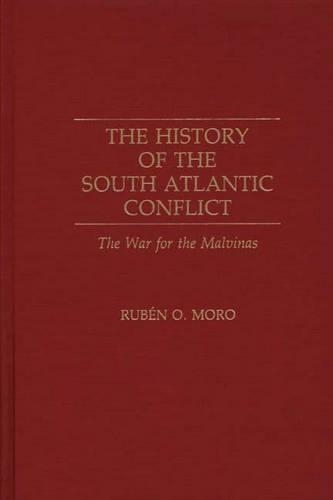
The History of the South Atlantic Conflict: The War for the Malvinas
(Hardback)
Publishing Details
The History of the South Atlantic Conflict: The War for the Malvinas
By (Author) Ruben Moro
Bloomsbury Publishing PLC
Praeger Publishers Inc
7th July 1989
United States
Classifications
Tertiary Education
Non Fiction
History of other geographical groupings and regions or specific cultures / socie
War and defence operations
997.11
Physical Properties
Hardback
376
Description
An examination of the facts and circumstances that put Great Britain and Argentina on a collision course in May 1982, paying particular attention to the points at which war could have been avoided. The author provides a detailed account of events, such as the attempts by the United States to intervene, the deployment of forces, the battle of May 1, the sinking of the cruiser ARA "General Belgrano" and the subsequent sinking of the British destroyer HMS "Sheffield", the battle of San Carlos, the fight for Darwin-Goose Green, the march to Fitz Roy and Mount Kent and the last stand of Puerto Argentino. In addition Moro also provides an analysis of the interaction of political and military events in modern conflict and studies of US-Latin American relations and an examination of weapons systems in modern warfare. The book takes issue with published British reports that treat the war as a discreet event that is now over, arguing that the conflict is not only still alive but also threatens both hemispheric peace and US influence in Latin America.
Reviews
. . . This is an interesting and well produced book, written in the straightforward way on would expect of a military writer. . .-Journal of the Royal Artillery
Between April 2 and June 14, 1982, Argentina and Britain were locked in a bitter struggle over the South Atlantic archipelago known as the Malvinas or Falkland Islands. Moro, an officer in the Argentine Air Force, presents a highly detailed account of the conflict, using a wide variety of sources and illustrating maneuvers and battles with a number of sketch maps. The author approaches the topic from a very pro-Argentine point of view, placing major blame for the extensive casualties during the clash on British Prime Minister Margaret Thatcher. At the same time, he is quite critical of the US for its logistical and communication assistance to the British forces, and accuses President Reagan of deserting his hemispheric allies. The translation is quite readable and seems to capture the spirit of the original Spanish. The bibliography is extensive, but does not include British materials since those documents have not been made available for researchers. For those interested in military history and Latin American diplomacy. Graduate level.-Choice
." . . This is an interesting and well produced book, written in the straightforward way on would expect of a military writer. . ."-Journal of the Royal Artillery
"Between April 2 and June 14, 1982, Argentina and Britain were locked in a bitter struggle over the South Atlantic archipelago known as the Malvinas or Falkland Islands. Moro, an officer in the Argentine Air Force, presents a highly detailed account of the conflict, using a wide variety of sources and illustrating maneuvers and battles with a number of sketch maps. The author approaches the topic from a very pro-Argentine point of view, placing major blame for the extensive casualties during the clash on British Prime Minister Margaret Thatcher. At the same time, he is quite critical of the US for its logistical and communication assistance to the British forces, and accuses President Reagan of deserting his hemispheric allies. The translation is quite readable and seems to capture the spirit of the original Spanish. The bibliography is extensive, but does not include British materials since those documents have not been made available for researchers. For those interested in military history and Latin American diplomacy. Graduate level."-Choice
Author Bio
RUBEN O. MORO is a commodore in the Argentine Air Force and the author of numerous articles on military history and tactics. Following his participation in the war for the Malvinas, he headed the Rattenbach Commission, which evaluated responsibility for the conflict.
